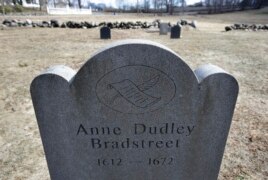06 April, 2019
Anne Bradstreet was the first person on the North American continent to publish poems, but her legacy has largely been lost to time.
Now, professors and students at Merrimack College in North Andover, Massachusetts are trying to find where she is buried. They also are working to build her legacy and, what they say is, her rightful place in Western literature.
Christy Pottroff is an assistant professor of English at Merrimack College. She and associate English professor Ellen McWhorter are leading several students in a project called Finding Anne Bradstreet.
"Even though we don't know much about her, she was a household name in the 17th century, both here and in England," Potroff told the Associated Press.
Bradstreet's book of poetry, "The Tenth Muse Lately Sprung Up in America," was popular both in the North American Colonies and in her native England. It was published in 1650. People in her home country were very interested in her descriptions of everyday life in the New World.
Bradstreet was a member of a well-known family that held important positions. Her father, Thomas Dudley, served as governor of the Massachusetts Bay Colony. She married Simon Bradstreet, who also served as governor. She died in 1672.
Her family was powerful and wealthy so she received more education than many women in her community of Puritans, a Christian religious group.
Most of her writings were about home life in the Colonies, her position as a woman and mother of eight and her love of her husband.
"I prize thy love more than whole mines of gold, Or all the riches that the East doth hold," she wrote in the poem, "To My Dear and Loving Husband."
She also wrote about watching the family's home catch fire.
"Then, coming out, behold a space, The flame consume my dwelling place," she wrote in "Verses upon the Burning of Our House, July 10th, 1666."

This Tuesday, March 19, 2019, photo, shows a commemorative marker for 17th century American poet Anne Bradstreet at an old burial ground, in North Andover, Massachusetts.
All of Bradstreet's writing was strongly influenced by her Puritan religious beliefs.
"She thought poetry was a vehicle for glorifying God," McWhorter said.
Bradstreet did not set out to become a published poet. Her writings were at first shared with family.
But her brother-in-law took her writings to London, where they were published. Some experts believe he did so without her knowledge, but it is more likely she did know he planned to have them published, Pottroff said.
The Merrimack project began just last year. But McWhorter's interest in Bradstreet dates to 2009 when she was interviewing for a job at the college. At that time, she heard that Bradstreet was buried somewhere on the school's grounds. It turns out that is not true. But researchers think she was buried not too far away in North Andover.
The professors and students believe she was buried where her family home used to be, which is now private property. They aim to use radar technology to find underground objects that might suggest a burial site.
The goal is just to find the burial site and bring Bradstreet's work and life back into the light.
"We want to rebuild some of her legacy that has been lost," said Emma Leaden, an English student at Merrimack helping with the project.
Leaden had never heard of Bradstreet but quickly got involved in the project.
"I just thought finding the grave of America's first poet sounded exciting and very Indiana Jonesy," she said.
The group is developing a software application about Bradstreet's life so people can take guided walks to follow her footsteps. The professors and students also are preparing a Bradstreet lesson plan for high school teachers to use in the classroom.
I'm Pete Musto.
Mark Pratt reported on this story for the Associated Press. Pete Musto adapted it for VOA Learning English. Mario Ritter Jr. was the editor.
We want to hear from you. Who was the earliest poet in your country? Write to us in the Comments Section.
________________________________________________________________
Words in This Story
legacy – n. something that happened in the past or that comes from someone in the past
thy – adj. relating to or belonging to you
doth – v. ancient third person singular present form of the verb ‘do'
consume – v. to destroy something with fire
dwelling – n. a place where a person lives
glorify(ing) – v. to honor or praise a god or goddess
interview(ing) – v. to participate in a formal meeting in which you are being considered for a job or other position